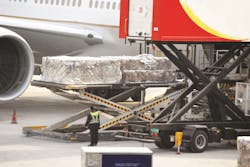Blockchain, E-commerce and AI
E-commerce is continually transforming the freight and cargo businesses. From supply-chain focused roots, the entire industry is now being pushed further to adapt to a much more customer-centric approach as convenience, cost and control become paramount to today’s ‘always on’ customer culture.
The world is hyper-connected, with customers accessing a plethora of websites and platforms to make almost instantaneous purchases from nearly every area of the planet. From independent sellers and small businesses to online shopping giants such as Amazon, the ability to sell creates the demand to deliver. As an industry, our ability to service this demand, at the right cost, quality and add value, has never been more subject to scrutiny, or crucial to our success.
Ultimately the arrival of the internet and online technology means everyone in the air freight, cargo and handling space must redesign their operations; customers expect services that are accessible, reliable, efficient, paper free and transparent.
The solution is innovative tech.
The Birth of E-commerce
Online shopping – or e-commerce, as we now know it, has been around longer than we often think. Looking at the history, it began in the 1970s, with the invention of email, but really took off with the dawn of the internet in 1990, during which time Amazon and eBay were the frontrunners. Fast-forward to the new millennium and former seedling book-seller Amazon has made online shopping the norm.
While e-commerce as a process hasn’t evolved significantly since 2003 – we still create online accounts, search and choose what we want and add products to carts and enter shipping and billing information – our industry’s response to it has had to, largely due to the unprecedented scale of online shopping success.
Air Cargo’s Rapid Growth
According to Boeing’s World Air Cargo Forecast 2016-2017, global e-commerce is projected to more than double over the next five years, growing from $1.7 trillion (USD) to $3.6 trillion by 2020.
The Asia-Pacific region is the fastest growing e-commerce trading bloc, with China at the forefront, as the world’s largest e-commerce market with $590 billion of goods sold in 2015 and growing.
Looking at this, it is not unreasonable to forecast that, by 2020, China’s e-commerce exports alone will be bigger than the combined existing markets of the US, Britain, Japan, Germany and France. Meanwhile, air cargo traffic growth remains strong in the Europe-Asia market, averaging 6 percent growth per year since 1995 and predicted to be around 4 percent per year over the next 20. Europe to South Asia is slightly higher at around 5 percent.
The connections are seamless, since airport ground handling services are relied upon for a large portion of transporting goods – particularly so for express delivery, where ships and tankers can’t compete.
Asia Pacific and the Middle East are expected to enjoy the highest growth rates, with emerging markets in Asia and South America fueling growth at Heathrow and exports to Mexico, Brazil, India and China rising. Heathrow, where ASC Cargo operates from Terminal 4, is one of the best connected global cargo airports with an ambitious strategy for growth and an environment for innovation and quality.
Maximizing Technology
The explosive growth of e-commerce and demand for deliveries of retail purchases is driving the next revolution in freight and cargo. We need to continually make technological changes and create solutions to reduce costs, improve efficiency, enhance flexibility and allow for greater speed and scale.
However, this isn’t necessarily a case of drowning in data, rather discovering more intelligent ways of moving cargo around the world with the efficiency increasingly required.
Already we’re seeing the increasing integration and digitization of the air cargo industry. As much as augmented reality (AR) may radically change a passenger experience in an airport, for example, the same technology could be applied to an airport ramp to support ground handling using AR.
Technology can make it easier and more cost-effective to embrace and implement new innovations in terms of process, products and service. It can help us to instantly keep up with regulatory changes, including customs, security, safety, financial management and corporate governance. Automating some of our business processes will enable paperless capture and storage of vital data. All of which can be used to strengthen relationships, productivity, responsiveness, communication and share knowledge.
The International Air Transport Association (IATA) for example, is spearheading its efforts to bring the air cargo industry into a paperless era. The e-Air Waybill (e-AWB) has been introduced so documents can be shared instantly between the whole supply chain reducing transporting, processing costs and wait times.
Real-time visibility is key for clients but also for end-user customers who want to be able to see where their goods are and the estimated time of arrival in a swift and straightforward manner.
While, Mercator has created an app for air cargo management and ground handling processes, Unisys has launched a cloud-based management system. ‘Digistics’ automatically records each transport and delivery checkpoint in the air cargo supply chain.
It provides airlines and forwarders with real-time visibility of shipments and subscribers can track and trace products quickly. The system also enables carriers to select specific automated cargo services, including inventory management, bookings, invoicing and accounting and examine performance data.
Another solution is blockchain – a technology dubbed a successor to cloud-based technology. In our industry, blockchain, the technology behind Bitcoin, could securely track all types of transactions across the air cargo supply chain so that all parties involved have record of cargo’s movements in a secure, decentralized system.
For example, every time a shipment moves from one part of the chain to the next, a blockchain system would record the transaction, creating a real-time activity log visible to the whole chain which cannot readily be altered.
By nature, air cargo is a complex process, and blockchain would help to reduce delays, costs and errors by tracking whole shipments. A complex technology, blockchain is still in comparatively early stages, but it’s potential to great maximum efficiency in an entirely paperless system is certainly one to watch as we move further into the 21st century.
Artificial Intelligence (AI) in Aviation
While blockchain can decentralize information from intermediaries and single, centralized institutions, artificial intelligence (AI) fits perfectly into this new futuristic model by learning from historic and real-time data to provide strategies, solutions and efficiencies free from the financial and time costs of ongoing human labor.
Flight management computer systems are used in some aircraft to help the pilot with information and for handling purposes. It has other uses in autopilot mode, and can support automated cabin pressurisation.
AI isn’t new, but how we use it will evolve considerably in terms of optimizing revenue and fleet management. This also applies in developing more effective and efficient route networks and ground handling operations. Plus, refining pricing strategies that consider a wider number of factors to provide more personalized solutions for customers, working to satisfy price-competitiveness.
The Future is What, Not When
Opportunity and tech will continue to play an increasingly pivotal role in the air freight and cargo industries, improving our performance and responsiveness to customers’ changing demands.
The next question we should be asking ourselves is not when to embrace new technologies, but rather what are the technologies on the horizon that we can prepare for and embrace?
About the Author

Ignazio Coraci
Ignazio Coraci is CEO of ASC Cargo Limited. He is also a member of the board and Company Secretary of Cargo Invest Limited, based at London’s Heathrow Airport.
